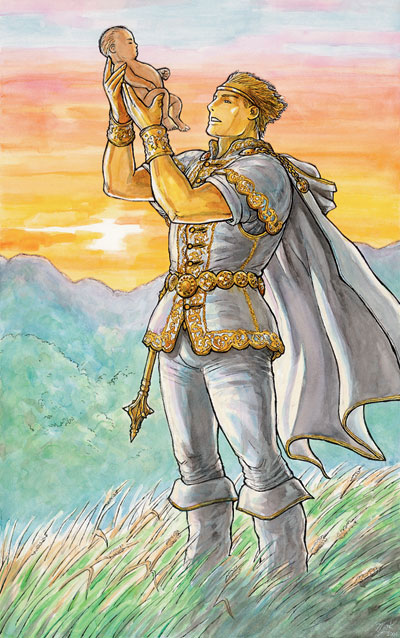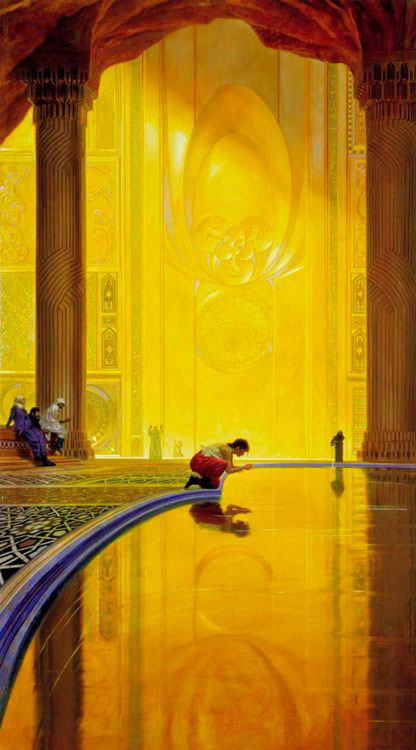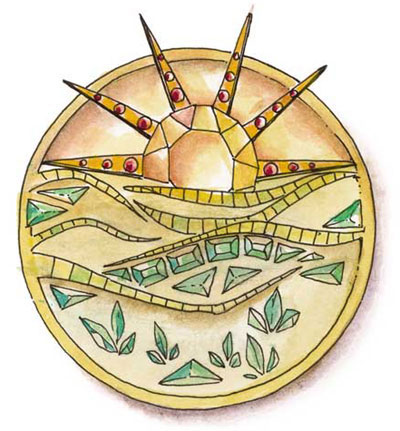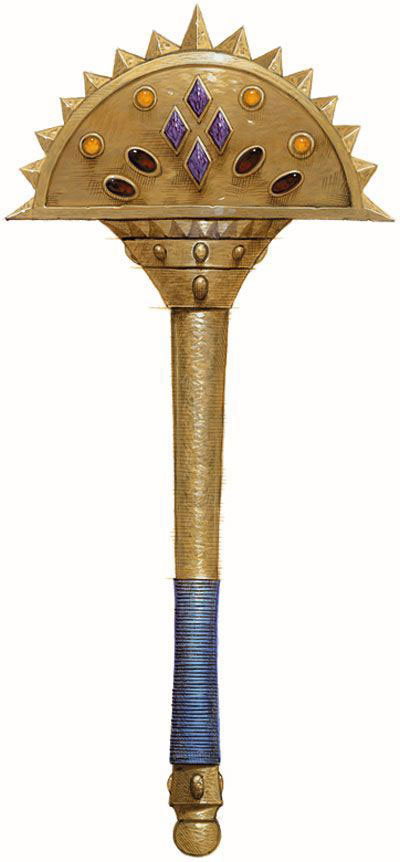Lathander
Whenever humans embark on a new journey, enter a contract, or start a political or romantic relationship, chances are good that they whisper a prayer to Lathander (lah-than-der), deity of dawn, renewal, and vitality. Though he is among the oldest of the Abian pantheon, the Morninglord nonetheless retains the cherry optimism of youth that makes him the perfect symbol of beginnings. Ever willing to pass over the defeats of today to focus on the victories of tomorrow, Lathander preaches a doctrine of proactive good works and constant reevaluation of society’s traditions and mores. He also urges the destruction of undead, which he views as a vile corruption that mocks creation and true life.
Critics suggest that Lathander’s aggressive altruism often gets in the way of his good sense. His vanity and enthusiasm cause him to discount the consequences of his actions: He simply hopes for the best and attacks a problem head on, regardless of the ramifications. Never was this character flaw so clearly illuminated than during the Dawn Cataclysm in which Lathander attempted to reshape the entire pantheon in his own image and thereby triggered a major struggle. His ultimate failure resulted in the destruction of several deities and powerful outsiders and led to the collapse of a half-dozen theocracies.
Clergy and Temples
Despite the failures of the distant past, Lathander’s faith remains extremely popular and powerful today, especially among idealistic young nobles (though seldom their parents). They claim to be personally tasked by the Morninglord to see to the affairs of their lessers, as though their fortuitous accident of noble birth granted them a writ to serve as Lathander’s mortal representatives. For many young aristocrats, a foray into Lathanderism represents a last act of rebellion before accepting the responsibilities of the nobility. Those of truer heart, however, remain in the church and often end up making a profound difference in their community. Commoners appreciate such treatments, making the Morninglord popular among all social classes.
Clerics of Lathander pray at dawn. Most holy services take place just as the light of the sun breaks the horizon, with secondary gatherings occurring at high sun and sunset. Ceremonies are joyful but dignified and feature singing, offerings, and ritual drinking of well water touched by the light of dawn. On Midsummer morning and on the mornings of the vernal and autumnal equinoxes, Lathanderian clerics perform the Song of the Dawn, a popular and complex musical ceremony that attracts even nonworshipers to the Morninglord’s cathedrals. Lawful clerics often multiclass as paladins.
Clerics of Lathander tend to be ebullient utopists, “morning people” in every sense of the phrase. They encourage social, cultural, and political progress as agents of personal liberty, artistic expression, and racial harmony. Lathander’s clerics sponsor athletic and artistic competitions to showcase the talents of the community, and they often finance the recovery of lost treasures or important symbols to give the people hope and encourage further good works. The tenets of Lathanderism urge respect toward one’s fellows and the natural world and intolerance for evil or those who unwittingly aid evil through slothful inaction. Militant followers stand at the vanguard of efforts to clear civilized lands of harmful beasts or purge the taint of the undead from the world.
Powerful members of the church protect their communities from malign extraplanar interests by acting as exorcists or fiendslayers. The church recognizes no central authority; the head of each temple is afforded similar respect by followers everywhere. Clerics refer to one another as Dawnbringers.
Within the last year, Lathander’s most trusted servants have received word of their deity’s secret plan. Dawnbringers refer to a mysterious event known as the Deliverance, which will have important consequences for the world, especially for those who are antithetical to Lathanderian beliefs. No mortals know the details of the Deliverance, but the prospect of the Morninglord taking a more active role in the affairs of Abios fills his already excitable worshipers with an almost unsettling glee. They have initiated an aggressive proselytizing effort to encourage others to join their church before it is too late.
Dogma
Strive always to aid, to foster new hope, new ideas, and new prosperity for all humankind and its allies. It is a sacred duty to foster new growth, nurture growing things, and work for rebirth and renewal. Perfect yourself, and be fertile in mind and body. Wherever you go, plant seeds of hope, new ideas, and plans for a rosy future in the minds of all. Watch each sunrise. Consider the consequences of your actions so that your least effort may bring the greatest and best reward. Avoid negativity, for from death comes life, and there is always another morning to turn a setback into a success. Place more importance in activities that help others than in strict adherence to rules, rituals, and the dictates of your seniors.
History and Relationships
Lathander’s friendly demeanor makes him almost as popular among other deities as he is among the mortals of Abios. The deities, however, tend to have longer memories than their followers; many appreciate Lathander’s calls to action and altruistic rants but try to keep him from doing too much damage to the status quo. The Morninglord’s command over creativity brings him into friendly contact with Gond, and his unflinching hatred of the undead has made him a fast ally of Kelemvor. His list of allies consists of Tymora, Tyr, Torm, Ilmater, and Selûne.
Lathander somewhat naively holds evil deities such as Bane, Cyric, and Loviatar personally responsible for the majority of Abios' ills. He particularly dislikes Shar, whom he views as an eternally corrupting force, the foul cancer at the heart of every shadowy intrigue against him and his church. Lathander believes that the Dawn Cataclysm occurred because of the Lady of Loss secretly corrupted his efforts, and he is hatching plans to ensure that does not happen again.
Helm harbors ill feelings toward the Morninglord that date back to the Dawn Cataclysm, when Lathander indirectly caused the destruction of Helm’s lover Murdane, a lesser deity of reason and pragmatism. No doubt the Vigilant One would be chagrined to learn that Lathander has been working on some of the incantations and machinations that brought about that catastrophe so long ago. With Bane determined to bring all of Abios under his heel, many progressive deities believe that direct action must be taken to destroy evil once and for all, and that no unintended consequences of Lathander’s plans could be as threatening to the world as simply standing by and doing nothing.
Divine Classification
Greater Deity
Honorary & Occupational Titles
- Morninglord
- Commander of Creativity
- Inspiration's Dawn
- The Rose-and-Gold God
Children
Gender
Male







Comments